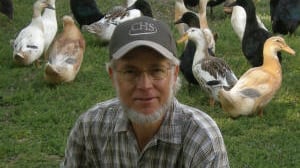According to Dave Holderread, geese and horses aren't all that different.
"I tell people geese are two-legged, feathered, small horses," he says. "The first time a goose hisses at us, we just stop, face it full on, and we shake our finger at it, say 'no' and make it back up. It's exactly the same, respectful thing you do with a horse—you make them back up."
Holderread and his wife, Millie, run Holderread Farms outside Corvallis, where, along with Paso Fino horses, they've been raising rare breeds of ducks and geese since 1961. Before downsizing five years ago, the farm had the largest genetic catalog of waterfowl in the world—close to 900 birds and 80 varieties.
Even now, the Holderreads' stock is massive. They currently have 14 horses and around 450 waterfowl, which they sell to customers who usually buy them as pets or for livestock shows. Without Holderread's preservation efforts, there are several duck species that might have gone extinct.
"Some breeds basically had disappeared," he says. "We were able to locate, in some cases, just two or three and get them going back again."
Holderread has revived species of ducks like the Australian Spotted, Ancona and the Miniature Silver Appleyard, and introduced varieties like the Saxony and Dutch Hook Bill to North America. He's also developed his own breed of duck, which Millie named the Golden Cascade.
Raising horses along with preserving rare breeds of ducks might seem a non sequitur, but the Paso Finos are actually integral to the operation. The horses help deter predators that prey on waterfowl, like cougars, bobcats, coyotes and red-tailed hawks.
But ducks and geese will always hold a particularly special place in Holderread's heart.
"Waterfowl caught my attention from my earliest memory, because I thought it was so cool to be a creature that could walk, swim and fly," he says. "It just seemed like the best of all worlds."

Click here for the full Best of Portland 2018 guide.

